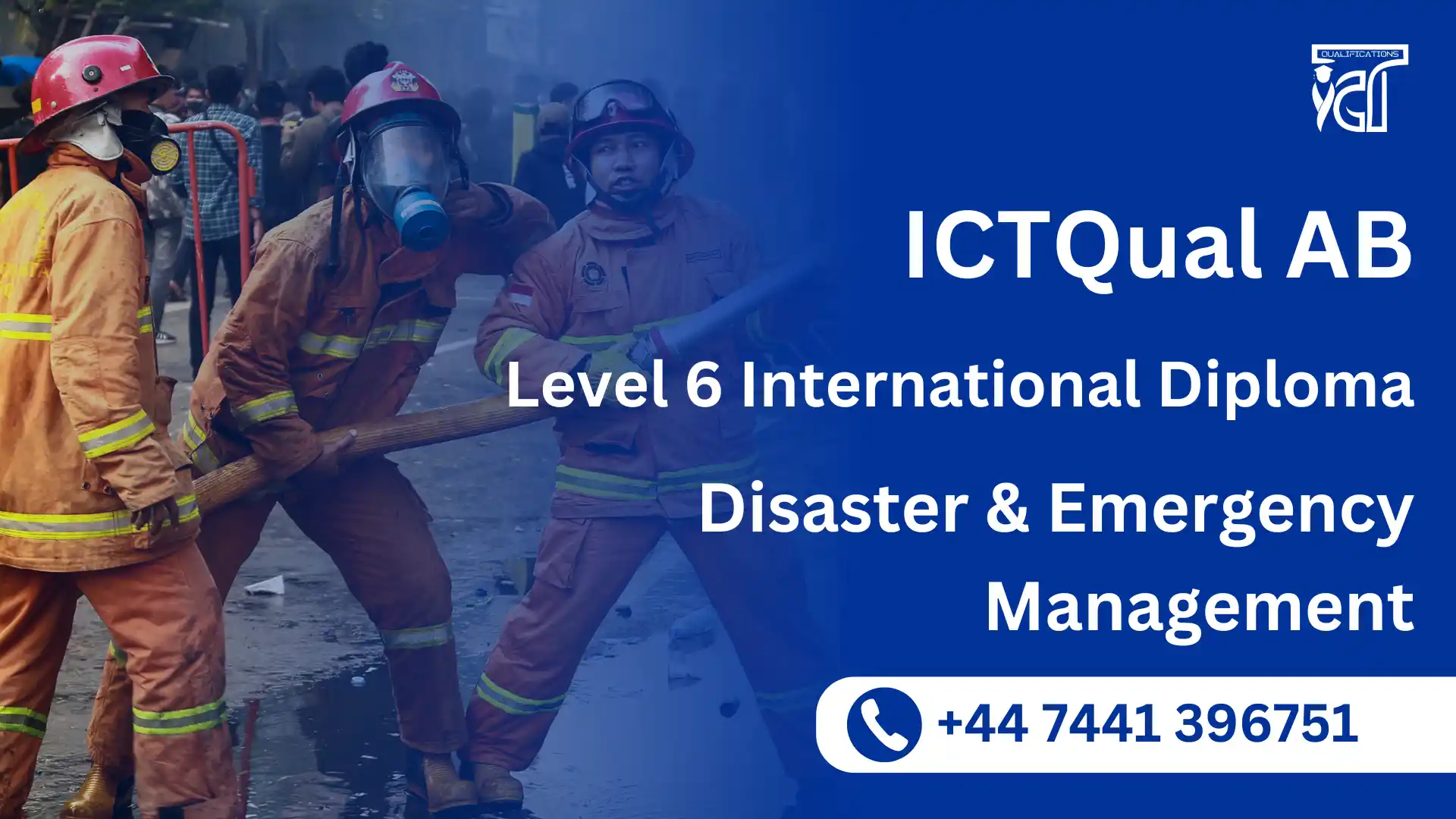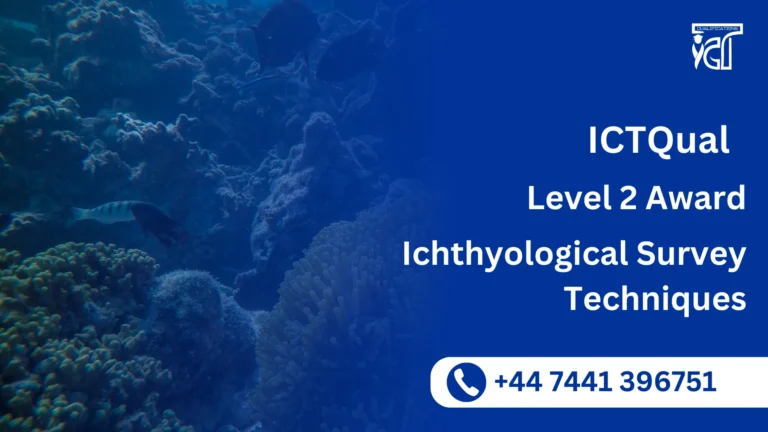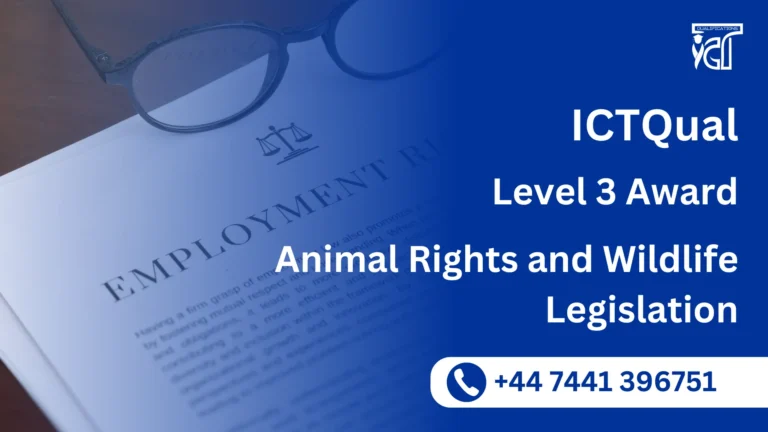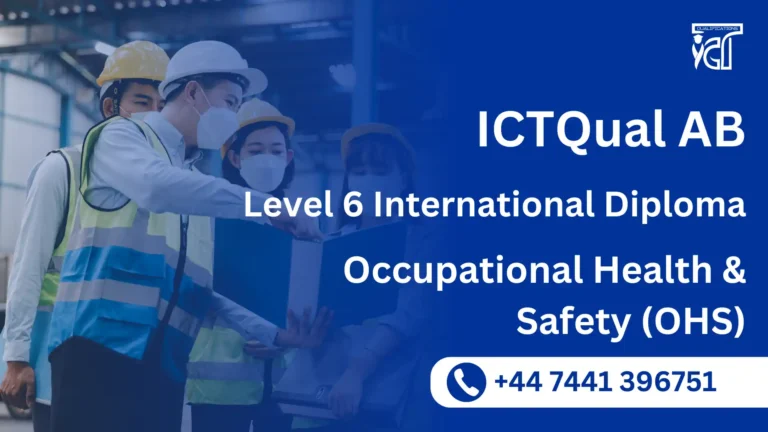The ICTQual AB Level 6 International Diploma in Disaster & Emergency Management is a comprehensive programme designed to equip learners with the skills, knowledge, and practical expertise needed to respond effectively to crises and manage emergency situations. Whether you are a fresh learner aspiring to build a career in disaster management or a professional seeking to advance into leadership roles, this diploma provides the tools to make a meaningful impact in a rapidly evolving field.
Spanning three years and structured around a 360-credit framework, the programme offers an in-depth exploration of disaster risk reduction, emergency planning, crisis management, humanitarian operations, and resilience building. Learners gain a robust understanding of both natural and man-made disasters, learning to assess risks, coordinate responses, and implement strategies that minimise impact on communities and organisations.
Graduates emerge with strong professional competencies, ready to pursue careers in emergency management, disaster response agencies, humanitarian organisations, public safety departments, and corporate risk management. The course emphasises leadership, strategic decision-making, and operational planning, ensuring learners are well-prepared to manage complex emergencies and contribute to policy and preparedness initiatives.
Key benefits of completing this diploma include enhanced career prospects, advanced subject-matter expertise, and the ability to lead effective disaster and emergency response programmes. Learners develop critical thinking, problem-solving, and project management skills, positioning themselves as capable and resilient professionals in a sector that continues to expand globally.
By combining theoretical foundations with practical applications, the ICTQual AB Level 6 International Diploma in Disaster & Emergency Management provides learners with a holistic, career-oriented education, enabling long-term professional growth and international recognition in the field of disaster and emergency management.
ICTQual AB Level 6 International Diploma in Disaster & Emergency Management
This qualification, the ICTQual AB Level 6 International Diploma in Disaster & Emergency Management, consists of 36 mandatory units.
Year 1 – Foundations of Disaster & Emergency Management
- Introduction to Disaster and Emergency Management
- Types and Causes of Disasters
- Principles of Risk Assessment and Management
- Emergency Planning and Preparedness
- Crisis Communication and Stakeholder Engagement
- Introduction to Humanitarian Response
- Disaster Legislation, Policies, and Governance
- Environmental Impacts of Disasters
- Resource Management in Emergency Situations
- Introduction to Project Management in Disaster Response
- Health and Safety in Disaster Management
- Ethical Considerations in Emergency Operations
Year 2 – Applied Disaster & Emergency Management Practices
- Advanced Risk Assessment and Vulnerability Analysis
- Disaster Mitigation Strategies
- Emergency Operations and Response Coordination
- Incident Command Systems and Leadership
- Humanitarian Logistics and Supply Chain Management
- Community Preparedness and Awareness Programmes
- Disaster Recovery and Rehabilitation Planning
- Crisis Management for Organisations and Institutions
- Use of Technology and Digital Tools in Disaster Management
- Environmental Sustainability in Disaster Operations
- Applied Research Methods in Disaster Management
- Operational Planning and Simulation Exercises
Year 3 – Strategic Leadership in Disaster & Emergency Management
- Strategic Leadership in Disaster Management
- International Disaster Management Frameworks and Standards
- Policy Development and Regulatory Compliance
- Advanced Crisis and Risk Communication
- Disaster Resilience and Business Continuity Planning
- Climate Change and Disaster Risk Reduction
- Emergency Preparedness for Critical Infrastructure
- Governance, Ethics, and Accountability in Disaster Management
- Innovation and Emerging Technologies in Emergency Response
- Strategic Planning and Resource Mobilisation
- Independent Research Project in Disaster & Emergency Management
- Capstone Project: Applied Disaster & Emergency Management
Learning Outcomes for the ICTQual AB Level 6 International Diploma in Disaster & Emergency Management Studies 360 Credits – Three Years:
Year 1 – Foundations of Disaster & Emergency Management
1. Introduction to Disaster and Emergency Management
- Explain the fundamental concepts, objectives, and scope of disaster and emergency management.
- Identify key stakeholders and their roles in disaster response.
2. Types and Causes of Disasters
- Analyse natural, technological, and human-induced disasters.
- Assess the primary causes and potential impacts of various disaster types.
3. Principles of Risk Assessment and Management
- Conduct basic risk assessments for organisations and communities.
- Develop strategies to mitigate and manage potential hazards.
4. Emergency Planning and Preparedness
- Design emergency preparedness plans for different scenarios.
- Identify resources, roles, and responsibilities in emergency planning.
5. Crisis Communication and Stakeholder Engagement
- Develop effective communication strategies during emergencies.
- Engage stakeholders to support disaster preparedness and response.
6. Introduction to Humanitarian Response
- Explain the principles of humanitarian aid and disaster relief.
- Evaluate organisational structures involved in emergency humanitarian support.
7. Disaster Legislation, Policies, and Governance
- Analyse national and international disaster management legislation.
- Apply governance frameworks to ensure compliance and ethical practice.
8. Environmental Impacts of Disasters
- Assess environmental consequences of disasters.
- Propose measures to reduce ecological damage during and after emergencies.
9. Resource Management in Emergency Situations
- Manage personnel, equipment, and logistical resources effectively.
- Prioritise resources according to disaster severity and operational needs.
10. Introduction to Project Management in Disaster Response
- Plan and execute small-scale disaster management projects.
- Monitor project performance and ensure alignment with objectives.
11. Health and Safety in Disaster Management
- Identify health and safety risks in emergency operations.
- Implement measures to protect responders and affected communities.
12. Ethical Considerations in Emergency Operations
- Apply ethical principles in decision-making during disasters.
- Ensure accountability and transparency in disaster response activities.
Year 2 – Applied Disaster & Emergency Management Practices
1. Advanced Risk Assessment and Vulnerability Analysis
- Conduct in-depth risk assessments for communities and organisations.
- Identify vulnerabilities and propose targeted mitigation strategies.
2. Disaster Mitigation Strategies
- Develop and implement disaster mitigation plans.
- Evaluate the effectiveness of preventive measures and interventions.
3. Emergency Operations and Response Coordination
- Coordinate multi-agency disaster response operations.
- Apply incident command principles to ensure efficient resource use.
4. Incident Command Systems and Leadership
- Lead operational teams during emergencies using structured command systems.
- Make critical decisions under pressure to maintain operational effectiveness.
5. Humanitarian Logistics and Supply Chain Management
- Plan and manage logistics for relief distribution and emergency supplies.
- Optimise supply chain processes to enhance disaster response efficiency.
6. Community Preparedness and Awareness Programmes
- Design and deliver disaster awareness campaigns.
- Engage communities to promote preparedness and resilience.
7. Disaster Recovery and Rehabilitation Planning
- Develop recovery plans to restore infrastructure and services.
- Implement rehabilitation strategies for affected populations.
8. Crisis Management for Organisations and Institutions
- Develop organisational crisis management frameworks.
- Ensure business continuity during and after emergencies.
9. Use of Technology and Digital Tools in Disaster Management
- Utilise GIS, early warning systems, and digital tools for disaster monitoring.
- Analyse data to inform response planning and decision-making.
10. Environmental Sustainability in Disaster Operations
- Integrate sustainability principles into disaster response activities.
- Minimise environmental impact during operations and recovery.
11. Applied Research Methods in Disaster Management
- Apply research methodologies to evaluate disaster management practices.
- Analyse data to support evidence-based decision-making.
12. Operational Planning and Simulation Exercises
- Develop detailed operational plans for simulated disaster scenarios.
- Evaluate performance and identify areas for improvement.
Year 3 – Strategic Leadership in Disaster & Emergency Management
1. Strategic Leadership in Disaster Management
- Lead organisational strategies in disaster preparedness and response.
- Develop policies and procedures that enhance operational resilience.
2. International Disaster Management Frameworks and Standards
- Analyse international standards and frameworks in disaster management.
- Ensure organisational alignment with global best practices.
3. Policy Development and Regulatory Compliance
- Develop disaster management policies aligned with legislation.
- Monitor and enforce compliance with relevant regulations.
4. Advanced Crisis and Risk Communication
- Develop comprehensive crisis communication strategies.
- Manage communication across multiple channels and stakeholders.
5. Disaster Resilience and Business Continuity Planning
- Design strategies to enhance organisational and community resilience.
- Implement business continuity plans to minimise disruption during emergencies.
6. Climate Change and Disaster Risk Reduction
- Assess the impact of climate change on disaster risk.
- Develop adaptation and mitigation strategies to reduce vulnerability.
7. Emergency Preparedness for Critical Infrastructure
- Plan for the protection of critical infrastructure during disasters.
- Conduct risk assessments and implement mitigation measures.
8. Governance, Ethics, and Accountability in Disaster Management
- Apply ethical leadership and governance principles in emergency operations.
- Ensure transparency, accountability, and compliance in decision-making.
9. Innovation and Emerging Technologies in Emergency Response
- Evaluate and apply emerging technologies to enhance disaster management.
- Integrate innovative solutions to improve response efficiency and effectiveness.
10. Strategic Planning and Resource Mobilisation
- Plan large-scale emergency operations and allocate resources effectively.
- Coordinate multi-agency responses to complex disaster scenarios.
11. Independent Research Project in Disaster & Emergency Management
- Conduct independent research on a relevant topic in disaster management.
- Present findings and evidence-based recommendations for practical application.
12. Capstone Project: Applied Disaster & Emergency Management
- Integrate knowledge and skills from all units into a comprehensive applied project.
- Demonstrate strategic planning, operational execution, and leadership in disaster scenarios.
Completing the ICTQual AB Level 6 International Diploma in Disaster & Emergency Management equips learners with practical skills, strategic knowledge, and professional credibility to excel in disaster response, emergency management, and humanitarian operations. The programme empowers learners to manage crises efficiently and make impactful contributions in both public and private sectors.
1. Advanced Knowledge in Disaster & Emergency Management
- In-depth understanding of disaster risk reduction, crisis management, and emergency planning.
- Insight into natural and man-made hazards, and mitigation strategies.
- Knowledge of humanitarian operations, resilience building, and emergency protocols.
- Awareness of global standards and best practices in disaster management.
- Ability to analyse and assess risks to enhance organisational preparedness.
2. Career Advancement Opportunities
- Enhanced employability in emergency services, humanitarian agencies, and corporate risk management.
- Eligibility for leadership roles in disaster management and emergency planning departments.
- Opportunities in policy-making, strategic planning, and crisis response coordination.
- Positions in national and international organisations addressing disaster and emergency challenges.
- Strong foundation for consulting, project management, and advisory roles.
3. Practical Skills Development
- Competence in emergency response coordination and crisis management.
- Training in disaster simulation, risk assessment, and contingency planning.
- Development of problem-solving, decision-making, and project management skills.
- Hands-on experience in managing complex scenarios and operational challenges.
- Ability to design and implement sustainable disaster response initiatives.
4. Professional Recognition and Credibility
- Demonstrates commitment to safety, preparedness, and humanitarian responsibility.
- Strengthens credibility in both public and private sector roles.
- Prepares learners for leadership positions in international disaster management networks.
- Provides a verifiable, globally recognised qualification in emergency management.
- Enhances reputation as a skilled and reliable disaster management professional.
5. Long-term Personal and Societal Impact
- Empowers learners to make meaningful contributions to community safety and resilience.
- Promotes ethical and responsible leadership in high-pressure environments.
- Encourages adoption of proactive disaster prevention and response strategies.
- Builds confidence in leading teams during emergencies.
- Supports global efforts in disaster risk reduction and humanitarian response.
The programme is designed for learners passionate about disaster response, crisis management, and humanitarian work. It caters to both newcomers and experienced professionals seeking advanced skills and international recognition.
1. Aspiring Emergency Professionals
- Fresh learners aiming to build careers in disaster management, emergency services, or humanitarian organisations.
- Individuals interested in public safety, risk assessment, and community resilience.
- Learners seeking structured education in disaster response and crisis mitigation.
- Those motivated to contribute to societal safety and preparedness initiatives.
- Enthusiastic learners eager to gain both theoretical knowledge and practical experience.
2. Experienced Professionals Seeking Career Growth
- Professionals in public or private sectors looking to specialise in emergency management.
- Individuals aspiring to leadership or strategic advisory roles in disaster response.
- Managers seeking advanced knowledge in risk reduction and crisis coordination.
- Consultants aiming to provide expertise in disaster preparedness or humanitarian projects.
- Professionals seeking international credibility and enhanced career opportunities.
3. Learners Interested in Policy and Governance
- Individuals eager to understand disaster management policies, compliance, and regulations.
- Those who wish to influence organisational strategies for emergency preparedness.
- Learners aiming to lead risk management and response planning initiatives.
- Professionals interested in ethical and socially responsible disaster management.
- Those motivated to contribute to sustainable disaster governance strategies.
4. Analytical and Decision-Oriented Thinkers
- Learners capable of assessing risks, interpreting data, and making evidence-based decisions.
- Individuals comfortable using technology and tools for disaster management simulations.
- Critical thinkers who can handle complex emergency scenarios effectively.
- Those interested in applying research to real-world disaster and crisis situations.
- Learners who value precision, strategic planning, and proactive problem-solving.
5. Globally Minded and Socially Conscious Learners
- Individuals committed to humanitarian efforts and global safety initiatives.
- Learners seeking roles in international disaster response organisations.
- Those motivated to create long-term societal and environmental impact.
- Professionals interested in working across cultures and regions in crisis management.
- Learners who aim to combine ethical leadership with practical emergency skills.
Completing this diploma opens a variety of career paths and professional advancement opportunities in emergency management, humanitarian operations, and disaster response.
1. Career Advancement in Disaster & Emergency Roles
- Leadership positions in emergency services and disaster management agencies.
- Management roles in humanitarian organisations and NGOs.
- Strategic roles in crisis response planning and corporate risk management.
- Advisory positions in public safety departments and community resilience projects.
- Opportunities in operational coordination, policy implementation, and disaster preparedness.
2. Specialised Professional Opportunities
- Disaster response coordinator, emergency management consultant, or risk analyst.
- Roles in humanitarian logistics, crisis communication, and contingency planning.
- Participation in national and international disaster risk reduction initiatives.
- Engagement in research and development of disaster mitigation strategies.
- Opportunities in sustainability-focused disaster resilience projects.
3. Leadership and Strategic Roles
- Manage teams in emergency response and disaster preparedness programmes.
- Oversee strategic planning for risk reduction and resilience initiatives.
- Influence policy and organisational practices in crisis management.
- Lead large-scale simulations, drills, and disaster response projects.
- Become a recognised expert in global emergency management networks.
4. Academic and Professional Development
- Further studies in disaster management, risk governance, or humanitarian operations.
- Professional certifications in emergency planning, crisis management, and public safety.
- Participation in international workshops, conferences, and research collaborations.
- Opportunities to teach or consult in disaster and emergency management programmes.
- Enhance global employability and professional credentials.
5. Global and Humanitarian Impact
- Contribute to international disaster preparedness and humanitarian response initiatives.
- Develop projects promoting safety, resilience, and community protection.
- Engage with global teams to address complex disaster challenges.
- Launch consultancy services or initiatives focused on emergency risk reduction.
- Become a professional making long-term societal and environmental impact.
As an approved ICTQual AB centre, we offer two certification routes tailored to learners’ experience levels:
Route 1: Experienced Professionals
- Designed for learners with at least six years of verifiable experience in disaster management, emergency services, or related sectors.
- Focuses on advanced modules, strategic projects, and practical applications.
- Ideal for professionals seeking leadership roles or specialised career advancement.
Route 2: Fresh Learners
- Tailored for those new to disaster and emergency management.
- Requires completion of 36 structured assignments covering all key areas.
- Provides a thorough foundation for learners starting their careers in emergency response or humanitarian work.
All learners must enrol with our approved ICTQual AB centre to access learning materials, guidance, and assessment support.
Entry Requirements
1. Minimum Age
- Learners must be at least 18 years old at the time of enrolment.
2. Educational Background
- Experienced Professionals (Route 1): Prior Level 5 qualification in a relevant field is advantageous but not mandatory.
- Fresh Learners (Route 2): A Level 3 qualification (e.g., A-levels or equivalent) is typically required.
3. Experience
- Route 1: Minimum of 6 years verifiable experience in disaster management, emergency services, or related sectors.
- Route 2: No prior experience required; learners complete 36 structured assignments.
4. Language Proficiency
- Proficiency in English is essential for understanding course content and completing assignments.
5. Additional Skills
- Basic IT skills (word processing, spreadsheets, and online research).
- Commitment to engage with the three-year, 360-credit programme and complete all assignments.
Register Now
Qualification Process
Qualification Process for the ICTQual AB Level 6 International Diploma in Disaster & Emergency Management
- Self-Assessment:
Begin by evaluating your eligibility to ensure you meet the qualification requirements, including work experience, knowledge, and language proficiency. - Registration:
Complete your registration by submitting the required documents, including a scanned copy of a valid ID, and paying the registration fee. - Induction:
An assessor will conduct an induction to confirm your eligibility for the course and explain the evidence requirements. If you do not meet the criteria, your registration will be cancelled, and the fee will be refunded. - Assignments & Evidence Submission:
Provide all assignments and the necessary evidence based on the assessment criteria outlined in the course. If you are unsure of the required evidence, consult with the assessor for guidance on the type and nature of evidence needed. - Feedback and Revision:
The assessor will review your submitted evidence and provide feedback. Evidence that meets the criteria will be marked as “Criteria Met,” while any gaps will be identified. You will be asked to revise and resubmit if needed. - Competence Evidence:
Submit final evidence demonstrating that all learning outcomes have been met. This evidence will be marked as “Criteria Met” by the assessor once it is satisfactory. - Internal Quality Assurance (IQA):
The Internal Quality Assurance Verifier (IQA) will review your evidence to ensure consistency, quality, and compliance with standards. - External Verification:
The IQA will submit your portfolio to ICTQUAL AB External Quality Assurance Verifiers (EQA) for final confirmation. The EQA may contact you directly to verify the authenticity of your evidence. - Certification:
Upon successful completion of all checks, ICTQUAL AB will issue your official certificate, confirming that you have attained the ICTQual AB Level 6 International Diploma in Climate Change & Sustainability Studies.






